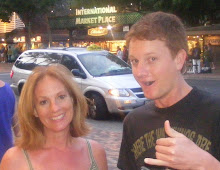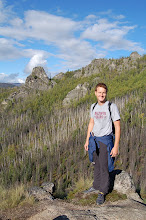SUDEP, Sudden Unexplained Death in Epilepsy, was the syndrome that caused our son's death. We had never heard of this risk till our son was already gone. Not one neurologist in 16 years of treatment had ever mentioned it to us. There is a movement afoot to educate families with epileptic members of the risk. I was very happy to see that this article appeared in the NY Times. The story, unfortunately, is always the same, and ours parallels the Wulchin's almost exactly.
Unmasking Silent Killer in Epilepsy
The New York Times
By ALIYAH BARUCHIN
Published: July 26, 2010
On July 9, 2009, Steve Wulchin went to wake his 19-year-old son, Eric, in their home in Boulder, Colo. Eric had been given a diagnosis of epilepsy three years earlier, but other than that, his father said, "there was nothing out of the ordinary." His seizures had been well controlled; he had not had one in six months.
Yet that morning, Mr. Wulchin found Eric lying on the floor. CPR and paramedics were too late; Eric had died at about 2:30 a.m.
The cause of Eric's death was ultimately listed as Sudep, for sudden unexplained death in epilepsy. The syndrome accounts for up to 18 percent of all deaths in people with epilepsy, by most estimates; those with poorly controlled seizures have an almost 1 in 10 chance of dying over the course of a decade.
Yet many patients and their families never hear about Sudep until someone dies. Mr. Wulchin said none of Eric's four neurologists ever mentioned it to the family.
"The message we got back was, 'There's no reason why he can't live a long and normal life,' " he said. "It never occurred to me that this was a possibility."
Now, physicians, researchers, advocates and relatives like Mr. Wulchin, a technology executive, are trying to raise awareness about Sudep. One of their goals is to establish registries of deaths and autopsy results, building databases to support future research.
Sudep most often affects young adults, typically ages 20 to 40, with a history of the convulsive seizures once known as "grand mal." Others at risk include those with difficult-to-control seizures, or seizures at night; people who take a large number of anti-epileptic medications or take them irregularly; African-Americans with epilepsy; and people with epilepsy whose I.Q. is under 70.
Many victims die in their sleep, and their bodies are often found face down. That prone position suggests that they may have had a neural, respiratory or cardiac crisis - or some combination - that left them momentarily unable, like SIDS babies, to rescue themselves from suffocating.
"After a seizure, the person is in a dramatically reduced state of awareness, and even their reflexes are reduced," said Dr. Orrin Devinsky, director of the Comprehensive Epilepsy Center at New York University.
For most people, he went on, "once your airway's obstructed, you roll over. For people with epilepsy, they don't."
Epilepsy, wrapped for centuries in secrecy and stigma, has gained wide attention in recent years. Not so with Sudep; even neurologists who specialize in epilepsy sometimes feel that mentioning it to patients who aren't at high risk may impose too much of a burden.
"Whenever I speak to a group of colleagues about telling all their patients, it's controversial," said Dr. Elizabeth Donner, a neurologist at the Hospital for Sick Children in Toronto and co-founder of the advocacy group Sudep Aware. "People worry about having a negative impact on the quality of life of people with epilepsy if we tell them about this."
Mr. Wulchin and other advocates say this attitude needs to change, even in the absence of a concrete way to predict or prevent a sudden death.
"People go off and have babies knowing very well that SIDS could strike," he said. "People have surgery and they get the standard warning that there could be adverse reactions to the anesthesia to the point of a fatality. We deal with these kinds of ambiguities all the time."
Dr. Donner agrees. "People with epilepsy have the right to know that Sudep exists, and they have the right to be responsibly counseled about how to reduce the risk," she said. "And actually, that doesn't have to be a painful conversation."
Dr. Devinsky, at N.Y.U., says he often directs at-risk patients to Britain, which has been at the forefront of Sudep awareness. There, devices like mattress alarms and structured pillows are sold to protect against death in sleep.
But just as research into epilepsy has been hindered by stigma, experts and advocates say the silence about Sudep is making it difficult to explore causes and treatments.
"I think this needs to be part of our conversation," said Gardiner Lapham of Washington, D.C., a board member of the advocacy group Citizens United for Research in Epilepsy, whose son, Henry, died in 2008, at age 4. "The more people talk about it, the more people are going to be interested in getting to the causes of why this is occurring, and ultimately identifying ways to prevent it."
Last year, researchers at Baylor Medical College in Houston, led by Dr. Jeffrey Noebels, discovered that a genetic mutation linked to a type of irregular heart rhythm called Long QT syndrome could also lead to seizures - suggesting that Sudep may result from electrical disruptions occurring in the brain and heart together. And this spring, the team isolated a mutation on a different gene that may cause seizure activity in the brain to direct extra impulses through the vagus nerve to the heart, making it slow and, in some cases, stop beating.
Subscribe to:
Post Comments (Atom)









5 comments:
So sad for you! I guess we just have to trust that we are not in control and God just needed him. Still makes it hard and I think we spend time trying to see what more we could have done. I know I do. xoxoxo
Sharon
I saw this article too. Just took Anna to her appt. yesterday to see how she is doing on Trileptal. They want to do genetic testing since there is such a prevalence for epilepsy in our family.
Thank you for sharing this, Karen. While its difficult to hear other stories of loss from this condition it is encouraging to see awareness and research increasing. And I hope that somehow connecting with families like this will bring you and your family a sense of community and support in your loss.
Love to you,
Mackenzie
Thank you for sharing - a local group (Dannydid.org) is undertaking the task of bringing SUDEP out of the shadows. Their founders lost their 4 year old - much like you, they knew nothing of SUDEP. They, along with the Epilepsy Fndn of Chicago have published an educational brochure and are making strides in getting a detection monitor into the field for testing. God Bless you.
Karen,
Thank you for sharing this. My 21-year old brother, who had controlled epilepsy (and was otherwise very healthy), was found in bed on Monday morning with no pulse. The autopsy results have come back and they cannot find any "cause of death." The more I am researching, the more I am finding SUDEP as a possible cause. Thank you so much for sharing this blog. I really want to help raise awareness and help to prevent this from happening to another family. I hope your family is working through it together. You are in my prayers.
God bless,
Meghan
Post a Comment